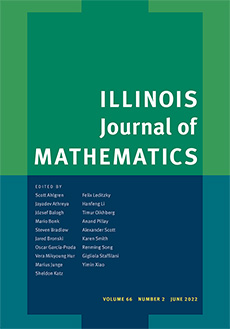Abstract
Let $\{ T_t\}_{t>0}$ be the semigroup of linear operators generated by a Schrödinger operator $-A=\Delta -V$ on $\mathbb{R}^d$, where $V$ is a nonnegative nonzero potential satisfying a reverse Hölder inequality, and let $\int_0^\infty \lambda \, dE_A(\lambda )$ be the spectral resolution of $A$. We say that a function $f$ is an element of $H_A^1$ if the maximal function $\mathcal{M}f(x)=\sup_{t>0} |T_tf(x)|$ belongs to $L^1$. We prove that if a function $F$ satisfies a Mihlin condition with exponent $\alpha >d/2$ then the operator $F(A)=\int_0^\infty F(\lambda )\, dE_A(\lambda )$ is bounded on $H_A^1$.
Citation
Jacek Dziubański. "A spectral multiplier theorem for $H\sp 1$ spaces associated with Schrödinger operators with potentials satisfying a reverse Hölder inequality." Illinois J. Math. 45 (4) 1301 - 1313, Winter 2001. https://doi.org/10.1215/ijm/1258138067
Information





